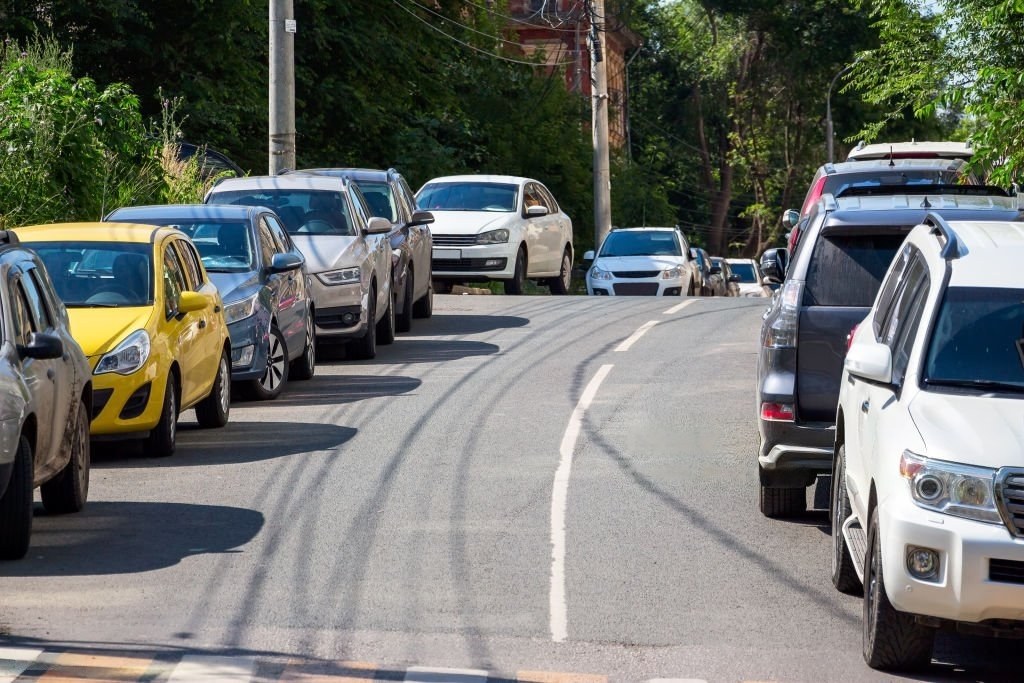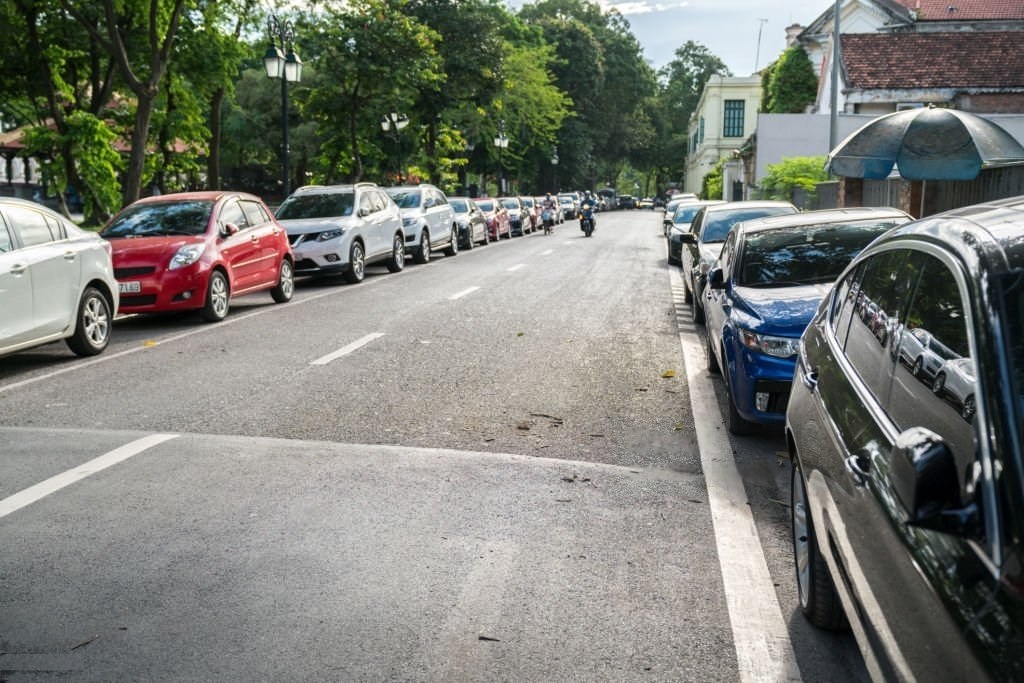Parking on a residential street allows non-residents a time frame of 72 hours or up to one week. However, it’s important to note that the rules vary significantly depending on the state you are in. Each state has its own set of regulations and guidelines governing the duration of parking.
If you still thinking about how long can a car be parked on a residential street then remember parking restrictions typically cap it at 2 hours in densely populated areas. While suburban neighborhoods extend the allowance to 3 days.
Streets become overwhelmed with vehicles when parking for extended periods. Some individuals might engage in inconsiderate parking practices, blocking other residents’ exits. So it’s necessary to follow the time limit rules.
Residential streets with overnight parking
Overnight parking regulations on residential streets fluctuate, contingent upon the region:
- Urban areas
- Suburban areas
Specific regulations regarding overnight parking are enforced by some cities, while others exhibit a laissez-faire attitude. It allows the vehicle to park as long as they abide by essential parking restrictions.
Urband Areas
These regulations are designed to keep order and provide accessibility to parking for the residents. Overnight restrictions can be in effect, such as;
- Permit zones
- Proscribed street parking times
Suburban Neighborhoods
The rules surrounding overnight parking tend to be more lenient in suburban neighborhoods. Vehicles can typically rest on the street all night long, but they need to follow some parking regulations such as;
- Refraining from blocking entrances or
- Avoiding water hydrants
However, certain suburbs necessitate overnight parking permits.
On-street Parking Laws
The laws governing resident parking fluctuate according to the locale. Nevertheless, some parking infractions are universal.
These infractions include:
- obstructing a driveway
- parking in close proximity to water hydrants
- Taking up space in “No Parking” areas
- Parking next to mailboxes
- parking on curbs or walkways
- Inadequate parking near intersections, crossings, and stop signs, parking in disabled spaces without authorization, surpassing posted time limits
- parking on the wrong side of the street.
- Temporary parking constraints might be in place for street cleaning or snow removal, and flouting these could lead to fines or vehicle immobilization.
New York’s 7-Day Parking Rule

In the bustling metropolis of New York City, there’s an ordinance that goes by the name of the “7-Day Rule.” Now, this rule isn’t about challenging you to find a parking spot within a week – it’s about how long you can keep your vehicle there without facing the parking police.
Here’s the deal: The 7-Day Rule lets the fine folks of the Empire State park their chariots in one spot for a whole seven days without incurring the wrath of the parking deities. It’s like a free pass to claim a piece of the street as your own for a limited time.
But why, you ask? Well, it’s all about keeping the concrete jungle flowing smoothly. They want to make sure everyone gets a fair shot at finding a parking space, and they don’t want any cars getting too comfy and turning the street into a parking lot.
Victoria’s residents can park for free
Now, let’s hop across the border to Victoria, the charming capital of British Columbia, Canada. Here, residents get a sweet parking deal – unlimited parking on residential streets by registering their car license number. It’s like having your own parking space that follows you around.
But beware, non-residents! You can’t just roll into town and snag a primo parking spot on a residential street. Nope, that’s reserved for the locals. You might receive a parking ticket if you park without the appropriate authorization.
California’s 72-Hour Limit
Heading over to the Golden State, California, we encounter a parking limit that doesn’t give you a whole week but instead offers a generous 72 hours. According to the California Vehicle Code 22651(k), if your vehicle takes up precious real estate for over 72 hours, you’re officially pushing your luck.
Now, in California, you might think the laid-back vibe would extend to parking, but there’s a limit even in paradise. If you break the 72-hour rule, you risk attracting the attention of the local police.
Your car could be making an unexpected journey on the back of a tow truck. And trust us, that’s a tow you’d rather avoid.
Washington Parking Rule
It is legally permissible to park along the street in front of another individual’s property in most cases. However, it is crucial to note that parking on the property itself is not allowed without proper authorization.
The area along the street in front of a property is typically considered public property and is available for parking, provided it does not obstruct pedestrian traffic.
It’s imperative to ensure that parking along the sidewalk does not hinder the passage of pedestrians. If a vehicle is parked in such a way that it encroaches upon the sidewalk, it should be positioned to allow pedestrians to pass comfortably including walkers or motorized scooters.
It’s essential to consider the accessibility and safety of all passersby when parking in such areas.
Consequences of Parking Violations
Parking illegally on a neighborhood street isn’t all fun and games. There’s a lineup of consequences waiting for those who dare to disregard the rules, including fines and tickets.
There is a possibility of their precious vehicle being towed away, and even the chance for some legal action against vandals. Take a closer look at what can go wrong when you park where you shouldn’t.
Fines and Tickets
Do you know that satisfying feeling when you find a parking spot right in front of your destination? Well, it can quickly turn into a pricey nightmare if you’re not careful.
Fines and tickets rain down on those who commit parking sins, like blocking driveways, playing parking Tetris in the middle of the street, or thinking a fire hydrant is your personal parking assistant.
The size of the fine depends on the type of offense and the spot of your parking blunder. Parking violations in New York City can carry fines of $35 to $515. Meanwhile in Chicago, parking illegally might cost you a crisp $50 to $200 bill.

Towing and vehicle eviction
Ordinarily, homeowners lack the direct authority to tow vehicles parked on public streets, as these thoroughfares fall under the purview of local authorities. However, residents may report illegally parked cars to local authorities who will determine whether towing is warranted.
Nonetheless, there are circumstances under which an owner may initiate a car tow:
- private property: If a car is parked on someone’s private property without their permission, the property owner usually has the legal right to have the vehicle towed. Legislation and ordinances set the guidelines for towing from private property, which may involve having clear signs that warn about the potential towing of unauthorized vehicles.
- Homeowners Associations (HOAs): In some neighborhoods governed by an HOA, they have parking policies in place. If a vehicle violates these rules, the HOA may have the right to tow it from the property. Typically, they’ll notify the owner and provide a chance to correct the problem.
Vandalism: Legal Actions
Now, let’s talk about the real troublemakers – vandals. If your car ends up as a canvas for their artistic expression, you have options. You can bring out the big guns and file lawsuits against these art enthusiasts by reporting the incident to the authorities.
If you prefer a more peaceful approach, filing an insurance claim or a lawsuit will also compensate you. Either way, it’s not something the vandals are likely to brag about at their next art exhibit.
Illicit Towing of Residents by Tow Truck Drivers
Illegally hauling vehicles not in violation is criminal and can constitute a breach of the law. This is especially applicable when such actions occur unauthorized or contravene local regulations. Drivers and companies operating tow trucks must adhere to strict rules and protocols.
Engaging in illicit towing may render people liable, subject to consequences including fines or penalties, revocation of a license, civil liability, and reputational damage.
Licenses for residential parking
Parking licenses in residential areas represent a common approach to managing parking in densely populated areas and neighborhoods characterized by limited parking availability. The duration for which a car can be parked on a street with a permit hinges upon local regulations.
Obtaining a permit requires the following:
- residents must create an application to provide evidence of residency and fulfill any associated fees. Permits like these prioritize parking for local residents and their guests, thereby ensuring convenient parking proximate to their homes.
The Significance of Adhering to Posted Signs
Vigilant observance of posted signs holds paramount importance in avoiding parking infractions, towing, or impounding. Signs may delineate specific time constraints, delineate no-parking zones, or demarcate areas designated only to residents.
It is also possible to communicate temporary restrictions, especially during special events, renovations, or street cleaning.
It is essential to bear in mind that some restrictions might solely apply during particular hours or on certain days of the week. Therefore, reading signs attentively and adhering to regulations is imperative.
Moreover, it’s worth noting police routinely patrol residential areas, making even brief infractions susceptible to parking tickets or penalties.
Conclusion
Understanding the rules and regulations surrounding parking on residential streets is essential to avoid unwelcome fines, towing, and legal consequences. When pondering the question of “how long can a car be parked on a residential street,” it’s vital to recognize that these rules can vary significantly from one location to another.
Generally, you can park your car on the street for 2 hours to 3 days (72 hours). Some states even allow you to park for a whole week so it depends on where you live. Always be mindful of posted signs, temporary restrictions, and your neighbors’ convenience when parking.
People Also Ask
Parking in front of someone’s house on a public street is generally permissible unless there are specific parking restrictions or permit requirements. However, it is essential to be considerate, avoiding actions like blocking driveways or causing inconvenience.
Parking in front of someone’s house on a public street is generally permissible unless there are specific parking restrictions or permit requirements. However, it is essential to be considerate, avoiding actions like blocking driveways or causing inconvenience. Always consult and abide by local parking regulations and posted signs to ensure legal parking.
The legality of parking in front of a mailbox varies depending on local regulations. Parking in such a manner can hinder mail delivery and result in fines or penalties. To ensure compliance with the law, familiarize yourself with local parking rules and adhere to posted signage pertaining to mailbox access.
Parking in front of someone’s driveway is generally illegal, as it obstructs access to private property. Local laws typically prohibit such parking. Always adhere to posted parking restrictions and respect others’ property to avoid penalties or towing.
You may have the authority to tow a car parked in front of your house if it violates local parking regulations. Only if it creates a safety hazard or breaches specific rules such as blocking your driveway, parking in a “No Parking” zone, or exceeding time limits. Verify your local laws and contact your city’s parking enforcement or non-emergency police line to report the issue and request towing if necessary.

